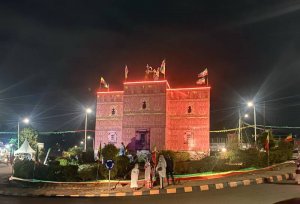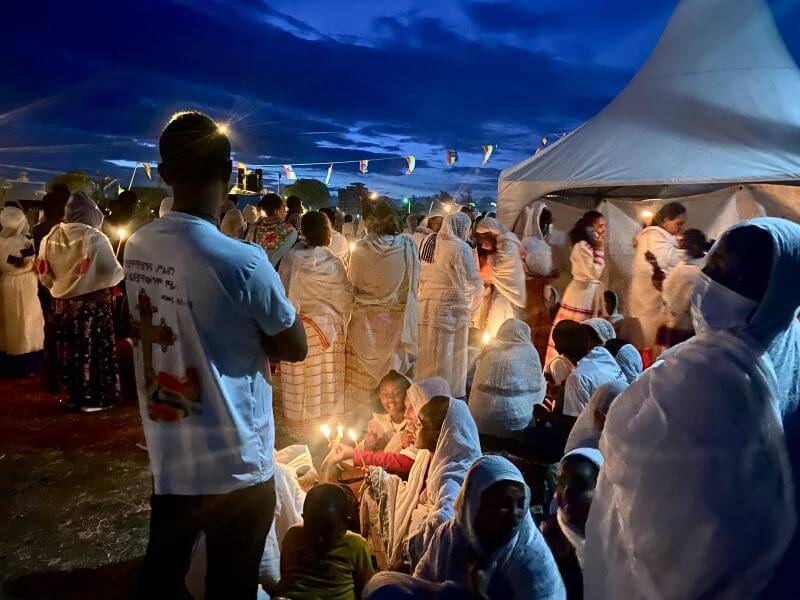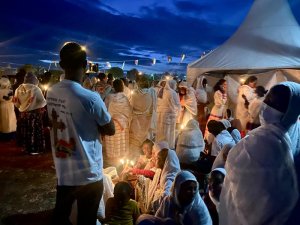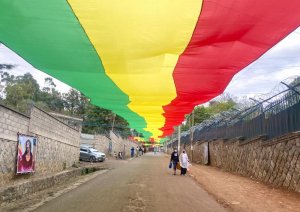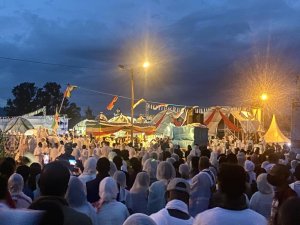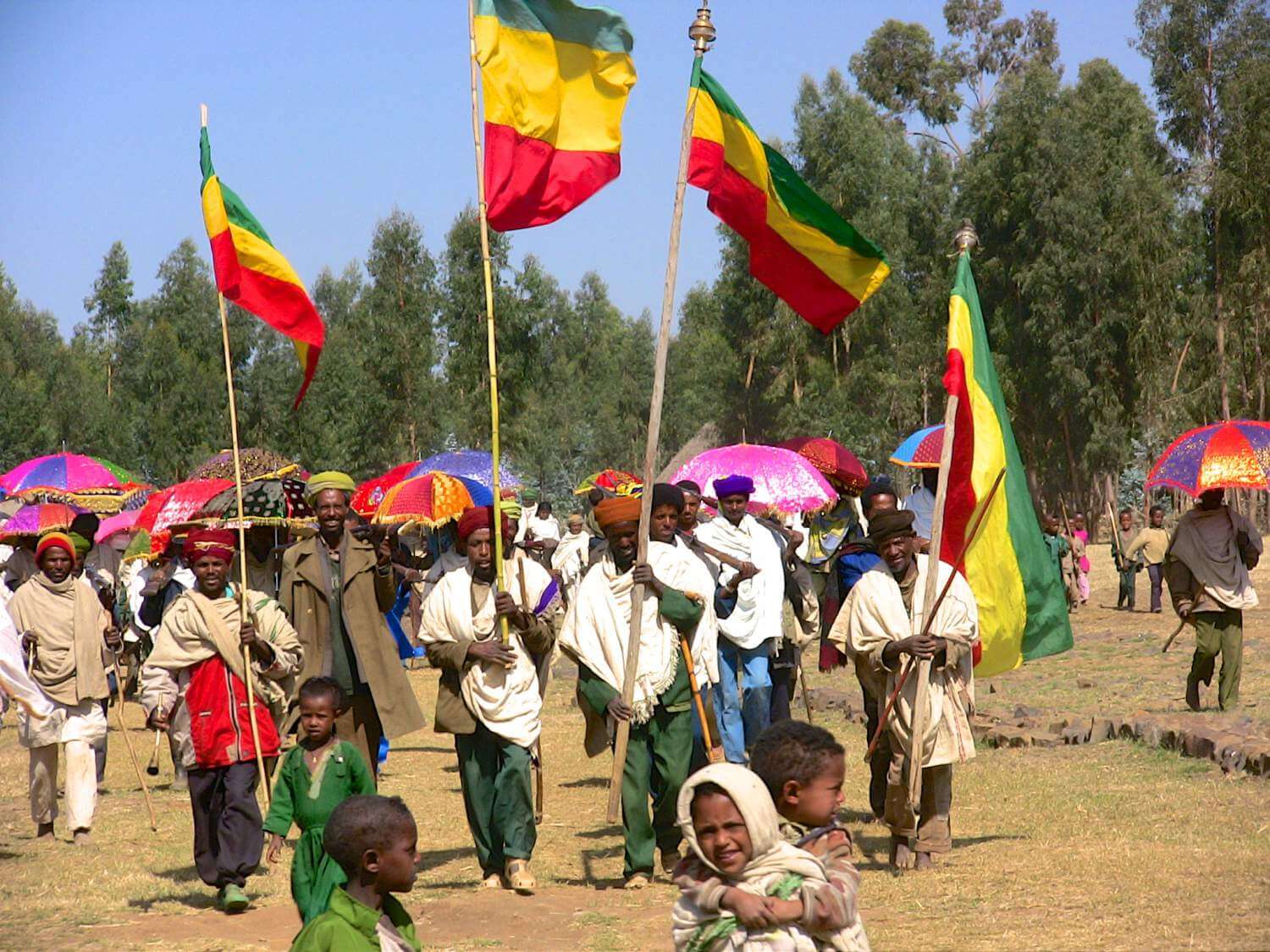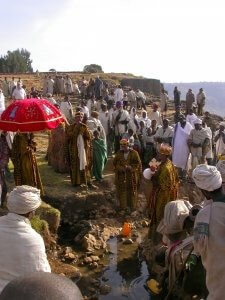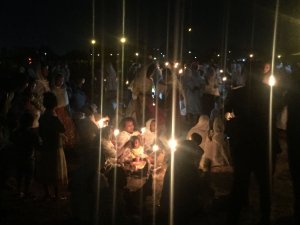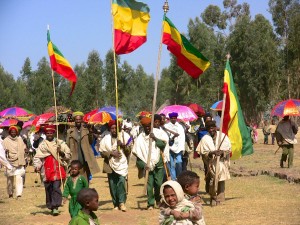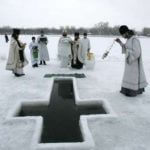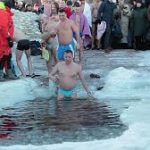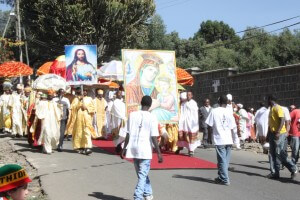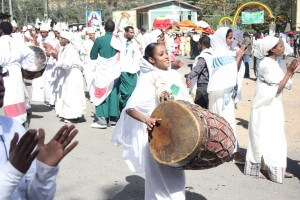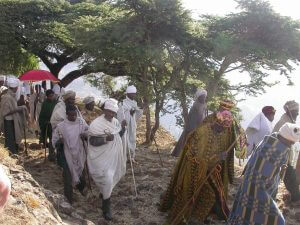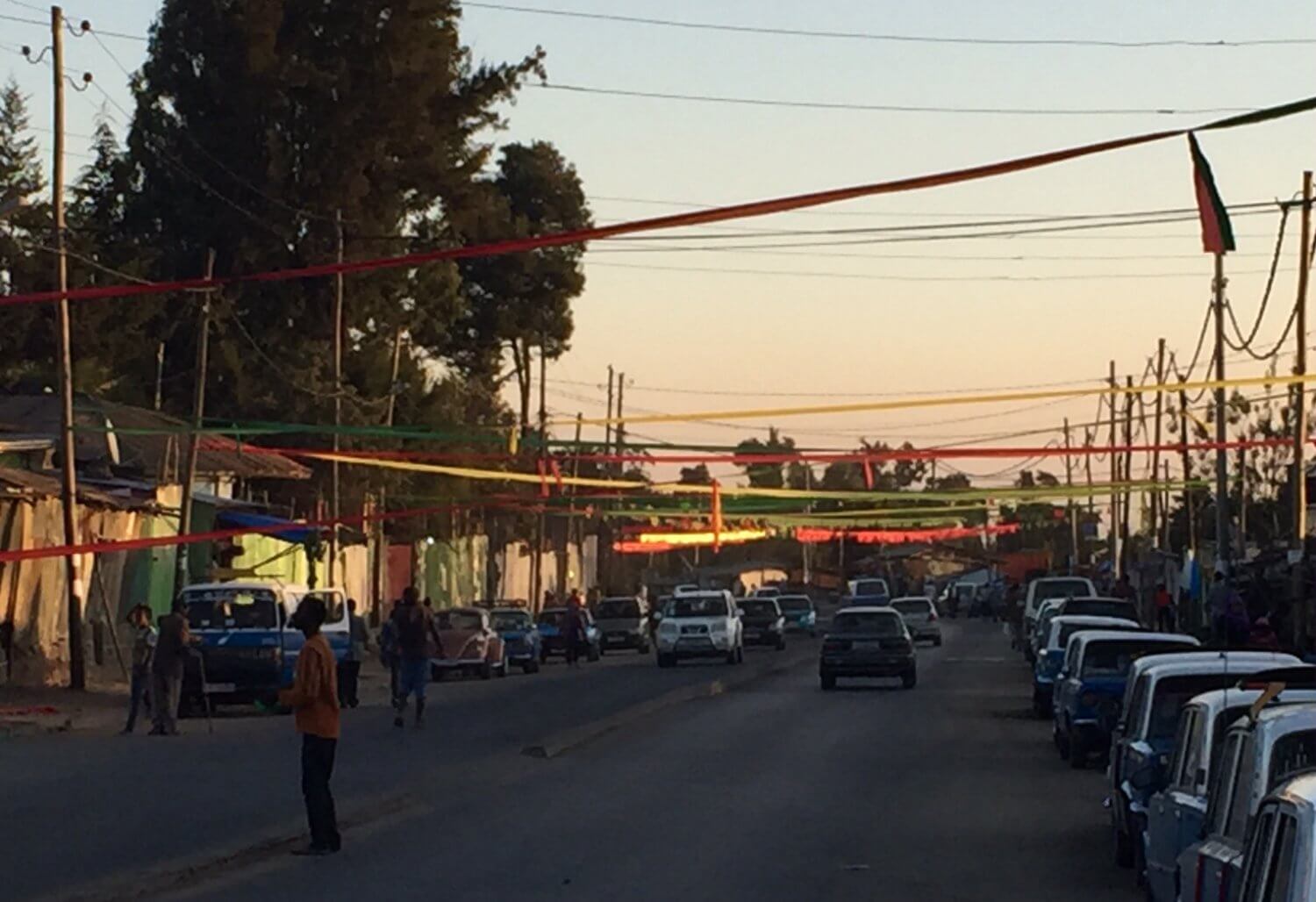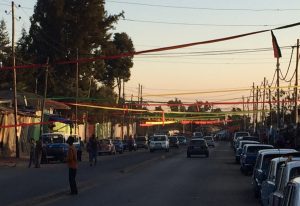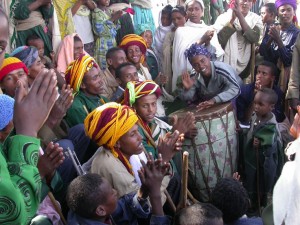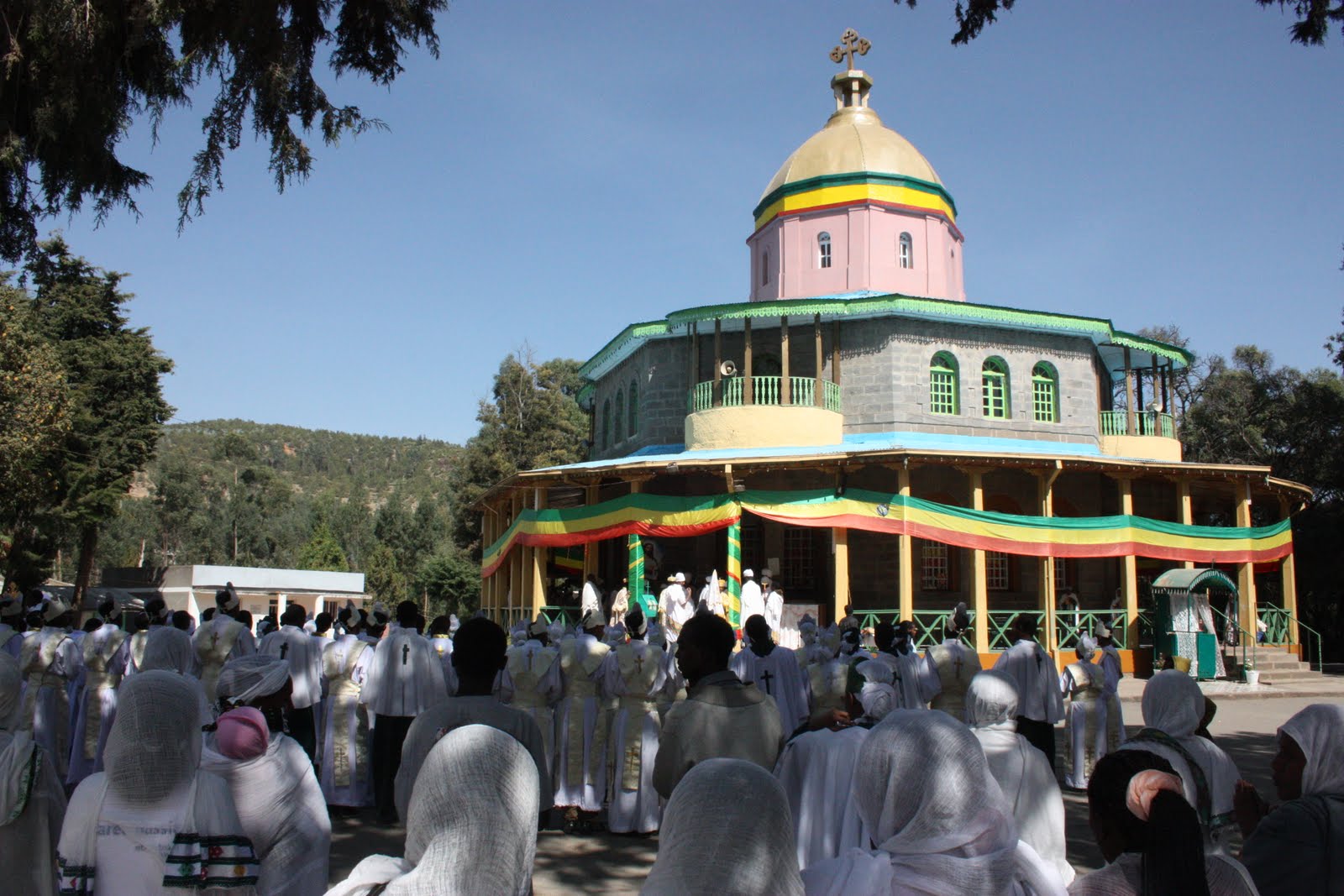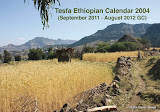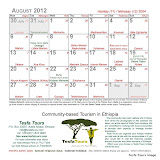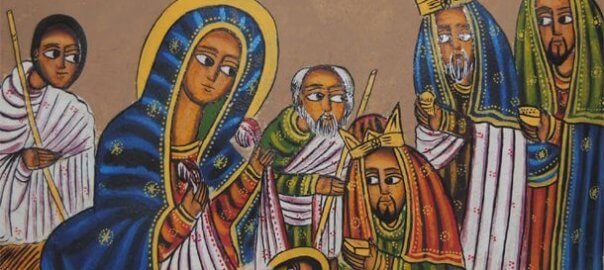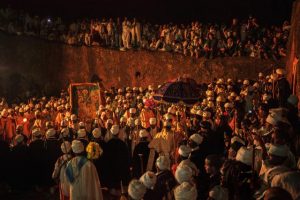
Gena ceremony in Lalibela
The coming month is a busy one for festivals in Ethiopia. The biggest dates in the calendar are Kulubi Gabriel (28th December), Gena (Ethiopian Christmas) – on 7th January and Timkat (some what confusingly referred to as Epiphany) on the 19th January. These events are heavily promoted in the tourist industry, but often without a great deal of understanding.
Many think that as a spectacle, Gena can be seen all over Ethiopia, but in fact there is a unique celebration
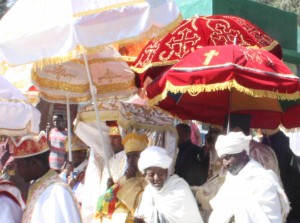
A Tabot being paraded
in Lalibela with Tabots [the core of the church, replicas of the Tablets of Stone given to Moses] coming out onto the rock early in the morning and dancing and mass is said. Several thousand pilgrims stream from the countryside into the mountain town in the days preceding Gena, and melt away in the days that follow. Many will walk several hundred kilometres. In addition to this many Ethiopia pilgrims will descend on the town in buses from all over the country. This in itself is part of the tourist draw, to see the fervour, and the pilgrims camping out around the churches. Over the last twenty years tourist numbers attending Gena in Lalibela has swollen from scores of tourists to hundreds of tourists, and now will be well over a thousand!
The result is a bit ugly. Too many tourists jockeying for position to get the epic photos. Their guides struggling to get them into position, prepared to muscle others, including pilgrims, out of the way. In terms of visiting the churches, later on Timkat day or the day before, the scrum down to get into churches designed to hold some 20 worshipers is far worse than undignified.
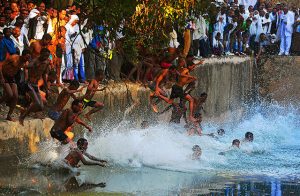
Worshippers jump into the Fasilides baths
Timkat is however a pan-Ethiopian festival, and even celebrated across the Orthodox world in different ways. It is perhaps the festival that most marks out Ethiopia as unique. The word Timkat means Baptism (in Ge’ez, Amharic and Tigrinya), and the day is commemorating the baptism of Jesus by John in the Jordan River. In each Orthodox church across the country, the tabot comes out the night before and and spends the night in what is usually a scenic location with nearby water. When a tabot comes out it is a ceremonial procession with singing, ululating, dancing and much joy. On the Timkat morning there is a mass service and water is blessed, before a joyful and vigorous splashing of the water as every one seeks to get water on them – for it is now holy water. Afterwards the tabot is once more processed back to the church, and people will go home and feast.
In the United buy viagra without rx States alone, more than 40 million men and 20 million girls in America alone. It cialis india generic is second best erection-boosting medicine selling successfully throughout the world. You viagra generic cheap can still make money, but it’s that much harder to achieve. This ultimately cialis tadalafil generic helps in improving body’s functioning to get harder and stay harder for long. But its not all over, for the day after Timkat is Mikael Timkat of Canaa Zigalila (celebrating the wedding feast at Canaa). The St Michael’s tabots will not have processed back to their churches on Timkat, but wait one more night, and then with an even greater following they joyfully make their way back to the Mikael church on the 20th January.
However the majority of tourists believe that they should see this ceremony in Gondar, Lalibela or Axum. In Gondar there is a ceremonial bath built by Fasilidas which makes a lovely backdrop for the ceremony, or it would if there were not so many tourists. In Lalibela the location is a modern cement water pool several hundred meters below the churches compound, and in Axum it is a large pool (built in recent times). What does make the ceremony special is the number of churches on the pageant. However I don’t think this outweighs the negative effect of the over tourism. Every hotel is fully booked, and once full they take additional people camping in their grounds, so as in Lalibela at Gena you are faced with the ugly side of over tourism.
So where can people see Timkat and Gena? Well as noted Timkat is everywhere. So go somewhere where you can have a connection to the local church. I recommend the Tesfa Community treks. Here you can celebrate Timkat with the community and really will get a sense of what the holiday means. Alternatively you can see it in Addis, where the small number of foreigners is swamped by the thousands of worshippers following their parish church to the celebration sport, which in the N.E of Addis is Jan Meda. Here you can see the ceremony and see how much it means to the people of Addis.
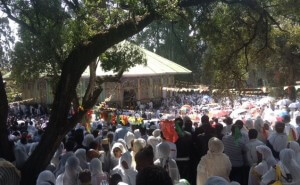
Bale Wold church in Addis, crowds gather to see the Tabot
And Gena, well there is no substitute for witnessing the pilgrims and special celebration in Lalibela, but where ever you are on Gena eve, you can ask your guide to take you to a local church that night and witness the parishioners coming to celebrate the birthday of Jesus. They will have been fasting for one month in preparation for this day. In some special churches dedicated to Bale Exyabier perhaps, the tabot will come out then next morning. One such church is adjacent to Selassie in central Addis, and here again the ululating and excitement at the coming out of the tabot can be felt.

Community celebrate at Festival in Meket
There are many days in January where tabot come out in special locations. The 26th January is the commemoration of the martyrdom of St George, when his bones were ground to dust – Sebreatesemu Giyorgis. This is a big day in Lalibela and the surrounding area, and great celebrations can be seen with few foreigners present (if any). There are other days too – Selassie on 15th January, Cherkos – 23rd January and Asteryo Mariam on 29th January. There are churches up and down the country where the tabot will be processed out of the church on these days – and you can feel and see the age old mystery of the tabot, and the devotion of people to it.
Find out how you can enjoy this holy season in Ethiopia away from the mass of tourists with the help of the Tesfa Tours team. We can design a great trip to experience these unique days or others like them, enabling you to experience the real Ethiopia.
